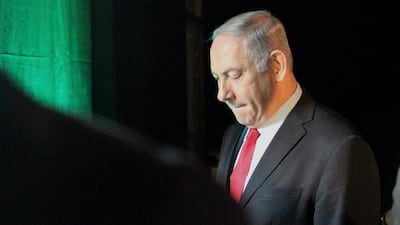Israeli discourse in the media and in cafe conversations pivoted around Prime Minister Benjamin Netanyahu's future on Wednesday after police recommended he be indicted on corruption charges.
With the prime minister's fate now in the hands of Attorney-General Avichai Mandelblit, Jewish Israelis were deeply and bitterly divided on whether Mr Netanyahu should step down or not.
While the prime minister and his right-wing supporters are adamant that the police had connived and contrived the charges against him, left-wingers and centrists say the police recommendations were so grave he should not continue in office.
Among Israel's Arab minority, which is threatened by discriminatory policies they say have only worsened under Mr Netanyahu, news was being followed closely but there was no such argument over what should happen with the premier.
"He should have resigned a long time ago," said Hilal Kitan, a translator who was voicing a near consensus among the customers at the Napoli cafe on the main street of Baqa al-Gharbiyyeh, an Arab city in northern Israel.
The cafe is a blend of Israeli and Palestinian influences, with patrons reading Hebrew daily newspapers and peppering their Arabic with Hebrew slang. Customers sit against the backdrop of an engraving of al-Haram al-Sharif, Islam's third holiest shrine in Jerusalem and a poster of Palestinian prisoners in Israeli jails.
Police called for indicting Mr Netanyahu for bribery, fraud and breach of trust in two cases. In one, he and his wife are said to have accepted illicit gifts, including hundreds of thousands of shekels worth of cigars and champagne and in another they said he made an illegal deal with a newspaper publisher to weaken its competitor in exchange for getting more favourable coverage.
But Arab citizens feel he has committed other transgressions besides corruption.
"He doesn't treat us as equal citizens and as human beings," said Kitan, 32, who, like other customers referenced a March 2015 election day statement by Mr Netanyahu urging his supporters to vote because Arabs were flowing "in droves" to the ballot station.
_______________
Read more:
Netanyahu faces the toughest challenge of his career
Israel's Netanyahu says discussing settlement annexation with US
Trump recognises Jerusalem as Israel’s capital
Police recommend corruption charges for Netanyahu
_______________
"He should resign because of all the [corruption] cases and because of the divide he makes between Jews and Arabs, between left and right. He is shredding the country."
"Israel is deteriorating, it's becoming less humane," Kitan added, noting plans by the Netanyahu government to expel 30,000 Eritrean and Sudanese asylum seekers. "He who is racist, is racist in every direction."
The Arab minority, which makes up a fifth of Israel's population, is comprised of those Palestinians and their descendants who were able to stay in the country during the mass displacement that accompanied Israel's creation in 1948.
It faces discrimination in land use, planning, budgets for infrastructure and education and is under-represented in employment in the government. It is the poorest sector of the Israeli population. The Netanyahu government says it has begun reducing the gaps, but Arab Israelis say they persist.
Under Mr Netanyahu, the sense of being treated as outsiders and second class citizens has increased with right-wing legislative initiatives such as the Israel as Nation State of the Jewish People Bill, which would strip Arabic of its status as an official language and, according to critics, give priority to the Jewish aspects of Israeli statehood over the democratic ones.
"Netanyahu has done a lot of damage that will take a long time to fix," said Ziyad Masarwa, 45, a lawyer. "He brain-washed people that they are under threat from north and south. When did he speak of peace?"
Mr Masarwa believes the police, not Mr Netanyahu. "They wouldn't take such a huge step unless they had a basis for it."
Abdullah Ghara, a computer science teacher who was sipping espresso, termed the nationality bill "another brick in the wall. It might well be that Netanyahu wants us to live well-but not here," Mr Ghara said.
His friend, retired teacher Abed Al Haj, said that because of discrimination in planning, he is being heavily fined for building without a permit. He says it is impossible for him to build legally since the authorities are holding up approval of a master plan.
"It wouldn't bother me at all if he ends up in jail," Al Haj said. "Even if he's innocent of all the charges, he is really bad for us. I prefer that he not be prime minister."

